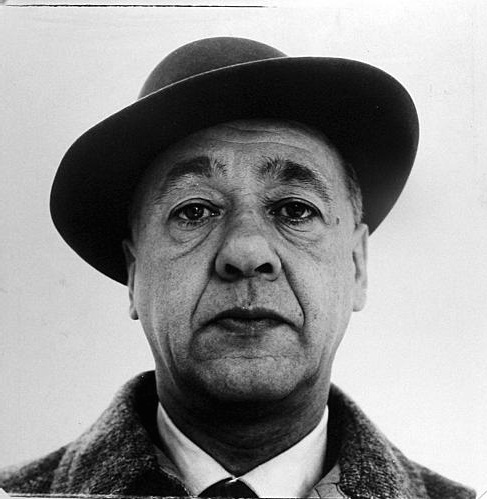Famous Romanians – the playwright, the cosmonaut and Hollywood's favorite Tarzan

 Guest writer Mariana Ganea continues her series of stories dedicated to famous Romanians from all walks of life. This time she writes about playwright Eugen Ionescu, astronaut Dumitru Prunariu, and swimming champion Johnny Weissmuller, star of the Tarzan films
Guest writer Mariana Ganea continues her series of stories dedicated to famous Romanians from all walks of life. This time she writes about playwright Eugen Ionescu, astronaut Dumitru Prunariu, and swimming champion Johnny Weissmuller, star of the Tarzan films
Eugen Ionescu was a Romanian- French playwright, famous for his contribution to the Theater of the Absurd. He was born in 1909 in the city of Slatina, in Olt County, in a mixed family, a Romanian Orthodox father and a French - Greek Romanian mother belonging to the Protestant Church. He spent his childhood mostly in France and returned to Romania in 1925. In Romania, Eugen Ionescu attended the Sfantul Sava School, one of the most prestigious high schools in Bucharest at the time, and then graduated French Literature at the University of Bucharest, becoming a French language teacher. In his university years he met his life long and famous friends Mircea Eliade and Emil Cioran. After he got married in 1938, he returned to France together with his family to complete his doctoral thesis. In 1939 he came back to Romania, only to return to France in 1942, first living in Marseille and then in Paris.
Eugen Ionescu, who changed his name to Ionesco to make it sound more French, began his literary career writing in various Romanian journals, the most representative early works being No, a rebel essay and Hugoliade - The grotesque and tragic life of Victor Hugo. Ionesco began his theatre career late, much like Samuel Beckett. The first play written by Ionescu was The Bald Soprano in 1948, which was performed for the first time in 1950. Then followed Jack, or the Submission (1950), The Lesson (1950), Salutation (1950), The Chairs (1952), The future is in Eggs (1951), Victims of Duty (1952) and The New Tenant (1953). All these works were appreciated as “anti-plays” which expressed the present feelings of alienation and the futility of communication. As the ’50s ended, Eugen Ionescu began to describe more humanized characters in a comic way in plays such The Killers (1959) and The Rhinoceros (1959). The later plays, such as Hunger and thirst (1966) and Macbeth (1972) are less popular and appreciated. He wrote only one novel, Hermit (1975), a libretto for the Dominique Probst’s opera called Maximilien Kolbe and a few theoretical writings Notes and Counter Notes. The critic Martin Esslin said Ionescu was a writer of the Theatre of Absurd, placing him alongside Samuel Beckett, Jean Genet and Arthur Adamov. He received many important awards, such as Tour Festival Prize for film (1959), Prix Italy (1963), Society of Authors Theatre Prize (1966), Grand Prix National for Theatre (1969), Monaco Grand Prix (1969), Austrian State Prize for European Literature (1970), Jerusalem Prize (1973). He held honorary Doctoral degrees from: New York University, University of Leuven, University of Warwick and University of Tel Aviv. He died in 1994 at 84 years old in Paris.
 Dumitru Prunariu was the first Romanian cosmonaut. He was born in 1952 in the city of Brasov. He graduated the Physics and Mathematics high school in his home town and in 1976 he received a degree in aerospace engineering at the University Politehnica in Bucharest. He worked in one of the most advanced aircraft industry facilities in Romania at the time, “IAR – Brasov” and then he enrolled in the Romanian Air Force Officer Training School in 1977. A year later, he was selected for spaceflight training as a part of Intercosmos Program, a Soviet space program which was designed to give nations on friendly terms with the Soviet Union access to manned and unmanned space missions. After gaining top marks during his three years of preparation, he was admitted to the mission on-board Soyuz 4 and Salyut 6 space laboratory. In 1981 Prunariu completed an eight-day space mission together the Soviet cosmonaut Leonid Popov, and completed scientific experiments in the fields of astrophysics, space radiation, space technology, space medicine and biology. Prunariu was the 102nd human being to go into space. He is full member of the International Academy of Astronautics (2008) and member of the Romanian National COSPAR Committee (1994). He joined the Association of Space Explorers in 1985 and between 1993- 2004 he was the permanent representative of this association at the United Nations Committee on the Peaceful Uses of Outer Space sessions. Since 1995 Prunariu has been the Vice/President of the International Institute for Risk, Security and Communication Management from Bucharest. Between 1998- 2004 he was president of the Romanian Space agency. Prunariu is a co-author of several books regarding space technology and space flight and has presented/published numerous scientific papers. His PhD thesis produced new developments in the field of space flight dynamics. He received many awards as : “Herman Oberth Gold Medal” by the German Rocket Society (1985), Medal of Merits for Space Exploration by Russian President (2011) and he has been (since 2011) a member of the Romanian Academy.
Dumitru Prunariu was the first Romanian cosmonaut. He was born in 1952 in the city of Brasov. He graduated the Physics and Mathematics high school in his home town and in 1976 he received a degree in aerospace engineering at the University Politehnica in Bucharest. He worked in one of the most advanced aircraft industry facilities in Romania at the time, “IAR – Brasov” and then he enrolled in the Romanian Air Force Officer Training School in 1977. A year later, he was selected for spaceflight training as a part of Intercosmos Program, a Soviet space program which was designed to give nations on friendly terms with the Soviet Union access to manned and unmanned space missions. After gaining top marks during his three years of preparation, he was admitted to the mission on-board Soyuz 4 and Salyut 6 space laboratory. In 1981 Prunariu completed an eight-day space mission together the Soviet cosmonaut Leonid Popov, and completed scientific experiments in the fields of astrophysics, space radiation, space technology, space medicine and biology. Prunariu was the 102nd human being to go into space. He is full member of the International Academy of Astronautics (2008) and member of the Romanian National COSPAR Committee (1994). He joined the Association of Space Explorers in 1985 and between 1993- 2004 he was the permanent representative of this association at the United Nations Committee on the Peaceful Uses of Outer Space sessions. Since 1995 Prunariu has been the Vice/President of the International Institute for Risk, Security and Communication Management from Bucharest. Between 1998- 2004 he was president of the Romanian Space agency. Prunariu is a co-author of several books regarding space technology and space flight and has presented/published numerous scientific papers. His PhD thesis produced new developments in the field of space flight dynamics. He received many awards as : “Herman Oberth Gold Medal” by the German Rocket Society (1985), Medal of Merits for Space Exploration by Russian President (2011) and he has been (since 2011) a member of the Romanian Academy.
 Johnny Weissmuller is a less expected addition to the team of Famous Romanians, as very few people know that the American competition swimmer and actor best known for playing Tarzan in films of the 1930s and 1940s, is in fact of Romanian origin. Weissmuller had one of the best competitive swimming records of the 20th century, being one of the world's fastest swimmers in the 1920s and winning five Olympic gold medals for swimming and one bronze medal for water polo. He won 52 US National Championships, set 67 world records and was reportedly undefeated in official competition for his whole competitive career. After his swimming career, he became the sixth actor to portray Tarzan, a role he played in 12 movies. Few people however know that Johnny Weissmuller was born into an ethnic German family from city of Timisoara in 1904. His family emigrated in USA when he was only a child. At the age of nine he got polio. At the suggestion of his doctor he began swimming. As a teen Weissmuller attended the Lane Technical College High School before dropping out to work various jobs, including as a lifeguard at Lake Michigan. While working as an elevator operator and bellboy at the Illinois Athletic Club, Weissmuller caught the eye of swim coach William Bachrach who trained him. Though he was foreign-born, Weissmuller gave his birthplace as Tanneryville, Pennsylvania, and his birth date as that of his younger brother, Peter Weissmuller. This was to ensure his eligibility to compete as part of the United States Olympic team.
Johnny Weissmuller is a less expected addition to the team of Famous Romanians, as very few people know that the American competition swimmer and actor best known for playing Tarzan in films of the 1930s and 1940s, is in fact of Romanian origin. Weissmuller had one of the best competitive swimming records of the 20th century, being one of the world's fastest swimmers in the 1920s and winning five Olympic gold medals for swimming and one bronze medal for water polo. He won 52 US National Championships, set 67 world records and was reportedly undefeated in official competition for his whole competitive career. After his swimming career, he became the sixth actor to portray Tarzan, a role he played in 12 movies. Few people however know that Johnny Weissmuller was born into an ethnic German family from city of Timisoara in 1904. His family emigrated in USA when he was only a child. At the age of nine he got polio. At the suggestion of his doctor he began swimming. As a teen Weissmuller attended the Lane Technical College High School before dropping out to work various jobs, including as a lifeguard at Lake Michigan. While working as an elevator operator and bellboy at the Illinois Athletic Club, Weissmuller caught the eye of swim coach William Bachrach who trained him. Though he was foreign-born, Weissmuller gave his birthplace as Tanneryville, Pennsylvania, and his birth date as that of his younger brother, Peter Weissmuller. This was to ensure his eligibility to compete as part of the United States Olympic team.
On July 9, 1922, Weissmuller broke the world record on the 100-meters freestyle, and he won the title in that distance at the 1924 Summer Olympics’. He also won the 400-meters freestyle and the 4 x 200 meters relay. As a member of the American water polo team, he won a bronze medal. Four years later, at the 1928 Summer Olympics in Amsterdam, he won another two Olympic titles. So, he won five Olympic gold medals and one bronze medal. He never lost a race and retired with an unbeaten Amateur record. In 1950, he was selected by the Associated Press as the greatest swimmer of the first half of the 20th Century In 1929, Weissmuller signed a contract be a model and representative. He traveled throughout the country doing swim shows and promoting swimwear. In the same year, he starred in his first film as Adonis in a the film called Glorifying the American Girl. His acting career, however, took off when he signed a seven-year agreement with Metro-Goldwyn-Mayer and played the role of Tarzan in the film Tarzan the Ape Man (1932). The movie was a success and Weissmuller became an overnight international star. Weissmuller ended up starring in six Tarzan movies for Metro-Goldwyn-Mayer. In 1948 he appeared for Columbia Pictures in Jungle Jim, and ended up making 13 films in this series until 1954.
He was also an accomplished amateur golfer and played in two official tournaments. In the late 1950s, Weissmuller moved back to Chicago and started a swimming club business. He also lent his name to other business ventures, but did not achieve a lot of success on the business side. He retired in 1965 and moved to Fort Lauderdale Florida, where he was Founding Chairman of the International Swimming Hall of Fame. In 1974, Weissmuller broke both his hip and leg, marking the beginning of years of declining health and in 1977 he suffered a series of strokes. In 1984, he died from pulmonary edema at the age of 79.
By Mariana Ganea, Guest Writer
(photos: Wikipedia Commons)











